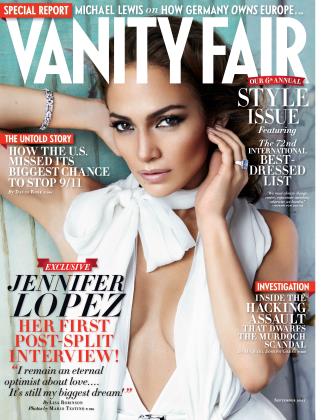Sign In to Your Account
Subscribers have complete access to the archive.
Sign In Not a Subscriber?Join NowHOT TYPE
Modern-day American horror: After 9/11, Shannen Rossmiller American mom and intrepid smalltown judge—makes infiltrating the online networks that spawn global terror cells and bringing them to justice her mission in The Unexpected Patriot (Palgrave Macmillan), written with V.F. reporterresearcher Sue Carswell. A Generation-Y-there-areno-jobs couple deals with recession-era realities by trafficking in drugs in Tony D'Souza'sMule (Mariner). Bedbugs (Quirk) infest the life of a young couple who move into a peculiar brownstone in Brooklyn in Ben H. Winters's diabolical tale of paranoia and domestic unrest.
Shake it up: The ever provocative Toure boldly articulates the complicated issues of self and racial identity in the age of Obama in Who's Afraid of Post-Blackness? (Free Press). Girl music nerds have been debating Beatles versus Stones and curating their collections for as long as male music snobs, but that perspective has been on low rotation; hail, hail, Courtney E. Smith'sRecord Collecting for Girls (Mariner), a mix tape of female rock history, playlists for getting busy and coping with heartbreak, and essential info such as how to decode a dude's CD collection (Yo La Tengo = romantically hapless; Leonard Cohen = asshole). First-time novelist Justin Torres unleashes We the Animals (Houghton Mifflin Harcourt), a gorgeous, howling coming-of-age novel that will devour your heart. Cabaret legend turned memoirist Ms. Justin Vivian Bond evokes the Tango (Feminist Press) of growing up a trans kid in a straight world. William Todd Schultz depicts freak-loving photographer Diane Arbus as An Emergency in Slow Motion (Bloomsbury). The blurry nature of truth in photography is the focus of Errol Morris's eye-opening Believing Is Seeing (Penguin).
Also this month: A wondrous trove of letters and sketches between Edward Gorey and Peter F. Neumeyer connect the Floating Worlds (Pomegranate) of these inspired collaborators; enchanting and witty and sparkling with intellectual banter, the book illustrates their artistic process and stands as a moving memoir of friendship. Contemporary Somalia is the setting for Nuruddin Farah's gripping novel Crossbones (Riverhead). Joumana Haddad'sI Killed Sche- herazade (Lawrence Hill) vents the "Confessions of an Angry Arab Woman." The heroine of Laurie Weeks'sZipper Mouth (Feminist Press) is a hilariously obsessed, motormouthed junkie. Lily Tuck elegantly limns 43 years of a marriage in I Married You for Happiness (Atlantic Monthly Press). Arlaina Tibensky's teenage protagonist becomes fixated on Sylvia Plath in And Then Things Fall Apart (Simon Pulse). Feel the burn: Patricia Bosworth works out Jane Fonda (Houghton Mifflin Harcourt) while Jane Fonda works it in Prime Time (Random House). Queen of the Young British Artists and sensationalista Tracey Emin'sMy Life in a Column (Rizzoli) anthologizes pieces that appeared in The Independent.Christopher Hitchens's selected essays are Arguably (Twelve) his finest to date. Dana Priest and William Arkin uncover the out-of-country national-security state built up in response to 9/11 in Top Secret America (Little, Brown). Richard Locke reads the moral compasses of Critical Children (Columbia University) in literature. Sylvia Nasar'sGrand Pursuit (Simon & Schuster) is the history of modern economics. What horror.
ELISSA SCHAPPELL
Pulitzer Prize-winning poet Philip Schultz shares My Dyslexia (Norton). The Other Walk (Graywolf) collects new essays of Sven Birkerts. Erica Heller remembers her father, Joseph, in Yossarian Slept Here (Simon & Schuster). Ian Kershaw captures The End (Penguin) of Hitler's Germany. Rock Seen (Abrams) showcases 40 years of rock 'n' roll photographer Bob Gruen's pictures. Andrew Graham-Dixon paints Caravaggio: A Life Sacred and Profane (Norton). Michael Henry Wilson directs Scorsese on Scorsese (Cahiers du Cinema).
 View Full Issue
View Full Issue












Subscribers have complete access to the archive.
Sign In Not a Subscriber?Join Now